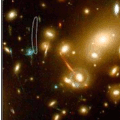357 - La foto más antigua del mundo
|Foto||||
|foto||||
357 - Das älteste Foto der Welt
357 - The oldest photo in the world
LOCUTORA Levanta los ojos al cielo en una noche estrellada.
Sprecherin|hebt||||||||sternenklar
|||||||||starlit
SPEAKER Lift your eyes to the sky on a starry night.
LOCUTORA Cuando miras las estrellas, no las estás viendo como ellas son ahora, sino como eran hace mucho, muchísimo tiempo atrás.
||siehst||Sterne||||sehen||||||||||sehr viel||zurück
ANNOUNCER When you look at the stars, you are not seeing them as they are now, but as they were long, long ago.
LOCUTOR La luz de las estrellas viaja a través del espacio hasta llegar a tus ojos.
Sprecher||Licht||||||||Raum|||||
ANNOUNCER Starlight travels through space until it reaches your eyes.
Ese viaje toma su tiempo.
That trip takes time.
LOCUTORA La luz es el objeto más veloz del universo.
|||||Objekt||schnell||Universum
|||||||rápido||
Más rápida que una bala, más ligera que un cohete supersónico, la luz corre a la fantástica velocidad de 300 mil kilómetros por segundo.
|||eine|Bulle||leicht|||Rakete|superschnell|||läuft|||fantastischen|Geschwindigkeit|||||
||||bullet||light|||rocket|supersonic||||||||||||
|||||||||foguete|||||||fantástica||||||
Faster than a bullet, lighter than a supersonic rocket, light runs at the fantastic speed of 300,000 kilometers per second.
LOCUTOR ¡300 mil kilómetros por segundo!
LOCUTORA Si estuvieras montado en un rayo de luz, en este segundo... .. habrías llegado a la Luna.
||wärst|montiert|||Strahl||||||wärst||||Mond
|||mounted|||ray||||||you would have||||
|||montado|||||||||teria||||
ANNOUNCER If you were riding on a beam of light, in this second... .. you would have landed on the moon.
LOCUTOR El Sol está un poco más lejos.
ANNOUNCER The Sun is a little further away.
Su luz demora 8 minutos en llegar a nuestros ojos.
||braucht||||||
||is delayed||||||
Its light takes 8 minutes to reach our eyes.
LOCUTORA Cuando te sientas con tu enamorado a ver la puesta de Sol, el Sol ya se puso hace 8 minutos.
|||sitzest|||Freund||||Sonnenuntergang|||||||||
||||||||||sunset|||||||||
||||||namorado|||||||||||||
ANKÜNDIGER Wenn Sie sich mit Ihrem Geliebten zusammensetzen, um den Sonnenuntergang zu beobachten, ist die Sonne bereits vor 8 Minuten untergegangen.
ANNOUNCER When you sit down with your lover to watch the sunset, the Sun has already set 8 minutes ago.
LOCUTOR La estrella más cercana al Sol se llama Alfa del Centauro.
|||||||||Alfa||Centauri
||estrela|||||||Alfa||Centauro
ANNOUNCER The star closest to the Sun is called Alpha Centaur.
Para llegar a ella necesitaríamos 4 años y tres meses cabalgando un rayo de luz.
||||würden wir brauchen|||||reitend||||
||||we would need|||||riding||||
||||precisaríamos|||||montando||||
To reach it we would need 4 years and three months riding a ray of light.
LOCUTORA Cuando miras esa estrella, la estás viendo como era hace 4 años y tres meses, el tiempo que demoró su luz en llegar a la retina de tus ojos.
||||||||||||||||||dauerte|||||||Netzhaut|||
|||||||||||||||||||||||||retina|||
||||||||||||||||||demorou||||||||||
ANNOUNCER When you look at that star, you are seeing it as it was 4 years and three months ago, the time it took for its light to reach the retina of your eyes.
LOCUTOR Y ahora, levanta la vista al cielo nocturno.
|||||Blick|||nächtlichen
||||||||night
ANKÜNDIGER Und jetzt schauen Sie zum Nachthimmel hoch.
ANNOUNCER And now, look up at the night sky.
Y escucha la última noticia que ha llegado desde la profundidad del cosmos.
|||letzte|||||||Tiefe||Kosmos
||||||||||||cosmos
And listen to the latest news that has come from the depths of the cosmos.
PERIODISTA ¡Última hora!
JOURNALIST Last minute!
Combinando el telescopio Hubble con el Mauna Kea de Hawai, los científicos acaban de fotografiar una galaxia situada a la asombrosa distancia de 13 mil millones de años-luz.
Kombinieren||Teleskop|Hubble|||Mauna|Kea||Hawaii||Wissenschaftler|haben||fotografieren||Galaxie||||erstaunlichen|||||||
Combining||||||||||||||to photograph||||||amazing|||||||
Combinando|||Hubble||||||Havai|||||fotografar|||situada||||||||||
Combining the Hubble telescope with the Mauna Kea of Hawaii, scientists have just photographed a galaxy located at an astonishing distance of 13 billion light-years.
La galaxia Abell se convierte así en el objeto más lejano de la Tierra y más antiguo del universo.
||Abell||||||||ferne||||||alt||
||Abell||||||||||||||||
The Abell galaxy thus becomes the farthest object from Earth and the oldest in the universe.
LOCUTORA Un telescopio es como una máquina del tiempo.
||||||Maschine||
ANNOUNCER A telescope is like a time machine.
A través de sus lentes, podemos ver los astros tal como eran hace miles de millones de años.
||||Linsen||||Sterne|||||||||
Through their lenses, we can see the stars as they were billions of years ago.
LOCUTOR La foto que nos acaban de regalar los telescopios muestra a la galaxia Abell cuando era niña, cuando el universo estaba recién nacido.
|||||haben||schenken||Teleskope|zeigt|||||||||||||n geboren
|||||||to gift||telescopes|shows|||||||||||||
|||||||||telescópios||||||||||||||
ANNOUNCER The photo that the telescopes just gave us shows the Abell galaxy as a child, when the universe was just born.
Es la fotografía más antigua del mundo.
||Fotografie||||
||photograph||||
||fotografia||||
LOCUTORA ¿Cómo será esa galaxia ahora, después de 13 mil millones de años?
ANKÜNDIGER Wie wird diese Galaxie nach 13 Milliarden Jahren jetzt sein?
ANNOUNCER What will that galaxy be like now, after 13 billion years?
¿Seguirá alejándose, habrá desaparecido, vivirán en ella seres inteligentes como nosotros?
wird|sich entfernen|wird|verschwunden||||Wesen|intelligent||
|moving away|there will|disappeared|||||||
|afastando-se|||||||||
Wird es sich weiter entfernen, wird es verschwunden sein, werden intelligente Wesen wie wir darin leben?
Will it continue to move away, will it have disappeared, will intelligent beings like us live in it?
LOCUTOR Tal vez ahora mismo, en esos confines del universo, en la galaxia Abell, tengan también telescopios enfocados hacia nuestra galaxia, la Vía Láctea.
|||||||Ecken||||||||||fokussiert||||||
|||||||confines||||||||||focused||||||
|||||||||||||||||focados||||||
LOCUTORA Y quizás se estén preguntando si aquí, en nuestro Sol y en los planetas que lo rodean, existen seres inteligentes.
||||||||||||||Planeten|||||Wesen|intelligent
|||||||||||||||||surround|||
|||||perguntando|||||||||||||||
ANNOUNCER And perhaps you are wondering if here, in our Sun and on the planets that surround it, there are intelligent beings.

